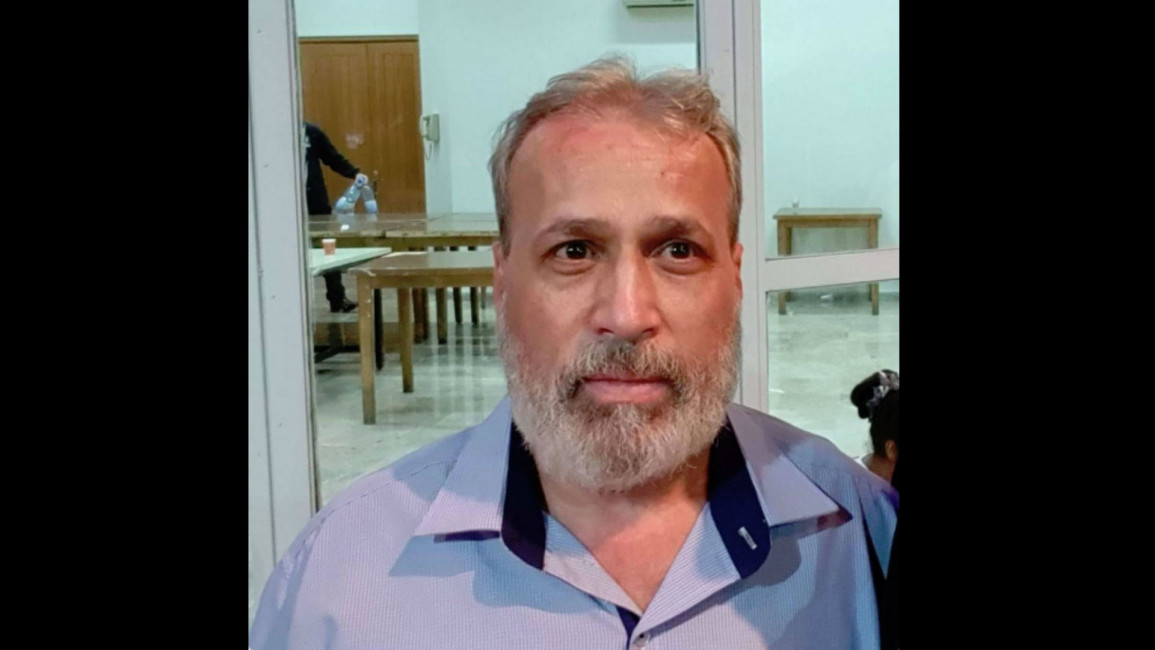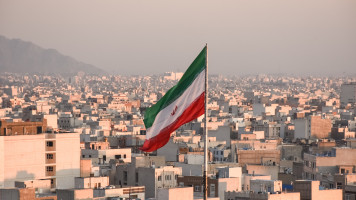Mossad killed Syrian chemical weapons chief, claims New York Times
Mossad killed Syrian chemical weapons chief, claims New York Times
Aziz Esber was assassinated by Israeli spies who believed the chemical weapons director was developing specialised missiles for Iran, according to an anonymous intelligence source.
3 min read
Syrian chemical weapons scientist Aziz Esber [Twitter]
Israel's spy agency Mossad was responsible for the car bombing that killed Syrian chemical weapons scientist on Sunday, a New York Times report claims.
The NYT cited an anonymous senior official from a Middle Eastern intelligence agency who had been informed about the operation to take out Dr. Aziz Esber.
Esber was the director of the Scientific Studies and Research Centre in the town of Masyaf and was killed by a roadside bomb in Hama province on Saturday night. His driver also died in the blast.
The source added that the killing of Esber constituted "at least the fourth assassination mission by Israel in three years against an enemy weapons engineer on foreign soil".
Many had already pointed fingers at the Israelis for being behind the assassination of Dr. Esber after the country was also blamed for a strike on the centre where he worked in September 2017.
The NYT report detailed that Mossad had been monitoring Esber for a long time and believed he was in charge of a covert chemical weapons unit, known as Sector 4, in the research centre where he worked.
Esber is also believed to have had privileged access to top officials in Syria and Iran, including the Presidential Palace in Damascus and the office of Qassem Soleimani, the leader of the Quds Force of Iran's powerful Revolutionary Guards.
According to the report, Esber was helping Iran develop precision-guided missiles in Syria by fitting heavy Syrian SM600 Tishreen rockets with new technology.
Esber had played a key role in developing Syrian chemical weapons in recent years, and was also charged with coordinating Iranian and Hizballah activities in Syria, according to the source.
The Iranian presence in Syria - increasingly spreading south towards the Golan Heights - is one of Israel's greatest concerns, as it fears that after the conflict winds down, fighters will turn their energy to Israel.
Syrian rebel group the Abu Amarah Brigades, a branch of the Islamist group Hayat Tahrir al-Sham, claimed responsibility for Esber's assassination, but was met with wide scepticism.
There have been 85 chemical attacks across Syria since 2013, the vast majority of which were carried out by the regime, according to Human Rights Watch. The Independent International Commission of Inquiry on the Syrian Arab Republic has confirmed 34 incidents.
After hundreds of people were killed in chemical attacks near Damascus in August 2013, a landmark deal with Russia was struck to rid Syria of its chemical weapons stash, staving off US airstrikes.
Despite the deal, last month the Organisation for the Prohibition of Chemical Weapons said that its fact-finding mission in Syia found "sarin was very likely used as a chemical weapon in the south of Ltamenah" in Hama province on 24 March and that chlorine was very likely used a day later at and near Ltamenah Hospital.
In April a suspected chlorine and sarin attack in the Syrian town of Douma on 7 April left at least 49 people dead.
Follow us on Twitter: @The_NewArab
The NYT cited an anonymous senior official from a Middle Eastern intelligence agency who had been informed about the operation to take out Dr. Aziz Esber.
Esber was the director of the Scientific Studies and Research Centre in the town of Masyaf and was killed by a roadside bomb in Hama province on Saturday night. His driver also died in the blast.
The source added that the killing of Esber constituted "at least the fourth assassination mission by Israel in three years against an enemy weapons engineer on foreign soil".
Many had already pointed fingers at the Israelis for being behind the assassination of Dr. Esber after the country was also blamed for a strike on the centre where he worked in September 2017.
The NYT report detailed that Mossad had been monitoring Esber for a long time and believed he was in charge of a covert chemical weapons unit, known as Sector 4, in the research centre where he worked.
Esber is also believed to have had privileged access to top officials in Syria and Iran, including the Presidential Palace in Damascus and the office of Qassem Soleimani, the leader of the Quds Force of Iran's powerful Revolutionary Guards.
Twitter Post
|
According to the report, Esber was helping Iran develop precision-guided missiles in Syria by fitting heavy Syrian SM600 Tishreen rockets with new technology.
Esber had played a key role in developing Syrian chemical weapons in recent years, and was also charged with coordinating Iranian and Hizballah activities in Syria, according to the source.
The Iranian presence in Syria - increasingly spreading south towards the Golan Heights - is one of Israel's greatest concerns, as it fears that after the conflict winds down, fighters will turn their energy to Israel.
Syrian rebel group the Abu Amarah Brigades, a branch of the Islamist group Hayat Tahrir al-Sham, claimed responsibility for Esber's assassination, but was met with wide scepticism.
There have been 85 chemical attacks across Syria since 2013, the vast majority of which were carried out by the regime, according to Human Rights Watch. The Independent International Commission of Inquiry on the Syrian Arab Republic has confirmed 34 incidents.
After hundreds of people were killed in chemical attacks near Damascus in August 2013, a landmark deal with Russia was struck to rid Syria of its chemical weapons stash, staving off US airstrikes.
Despite the deal, last month the Organisation for the Prohibition of Chemical Weapons said that its fact-finding mission in Syia found "sarin was very likely used as a chemical weapon in the south of Ltamenah" in Hama province on 24 March and that chlorine was very likely used a day later at and near Ltamenah Hospital.
In April a suspected chlorine and sarin attack in the Syrian town of Douma on 7 April left at least 49 people dead.
Follow us on Twitter: @The_NewArab



